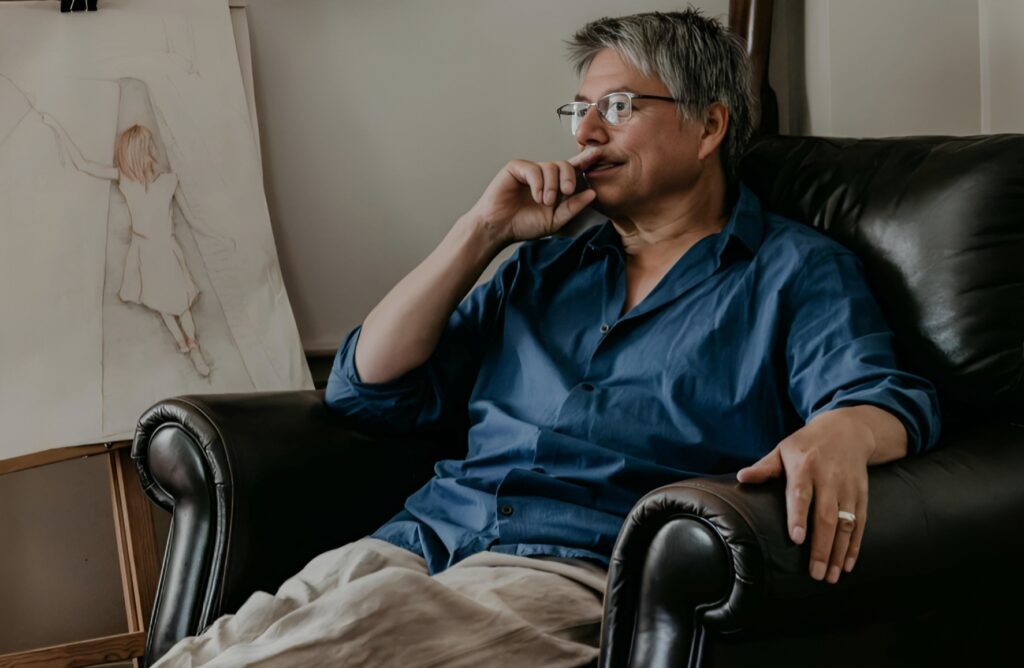
The Empathetic Enterprise
WE SPOTLIGHT THOSE BUILDING ORGANIZATIONS WHERE HUMANITY AND HIGH PERFORMANCE COEXIST
The Pattern Reader: Alden Darville and the Art of Empathic Leadership in an Uncertain World
BY CAMMANEX EDITORIAL
There’s a kind of knowing that can’t be taught — a quiet intelligence that listens before it speaks, that senses before it decides. For Alden Darville, that knowing began not in a boardroom or leadership seminar, but in the uneven rhythm of childhood: a home of strict love, a landscape of contradictions, and a boy learning to survive by reading the unspoken. Before empathy became a buzzword, before it appeared on corporate value charts or LinkedIn manifestos, Alden was already practicing it — not as philosophy, but as necessity. He grew up mixed-race — First Nations and Bahamian — in a predominantly white neighborhood. In that era, there were no smartphones, no digital distractions to numb the ache of difference. The outdoors was his classroom, the woods his refuge. He and his friends built forts, scraped knees, and stitched friendships out of curiosity and dirt. But when the streetlights flickered on, reality returned. Inside, a single father raised five children on two jobs and unyielding discipline. Alden remembers him as a man who “ruled with an iron fist because he had no other choice.” He was hard, but never hollow. His love spoke in deeds, not words. A roof fixed. A meal served. A life held together by sheer force of will. “Anyone who’s grown up with an unpredictable parent,” Alden says quietly, “learns to recognize patterns early. You start reading tone, energy, and silence before you ever learn to read people’s faces. That’s how empathy is born — in the space between survival and understanding.” It is, perhaps, the most unexpected origin story of a modern leader: the empath forged in discipline, the sensitive child shaped by structure. But that paradox of compassion built through resilience, is the architecture of Alden Darville’s leadership today.
Roots of Understanding
Alden’s father was his first leadership mentor. A man of few words and fewer indulgences, he believed in three things: honesty, hard work, and being good — but never weak. “He taught us how to make remedies, how to grow food, how to tie a knot that would hold under pressure,” Alden recalls. “He didn’t just raise us — he trained us to endure.” His older brother, six years his senior, became the counterpoint — a brilliant, endlessly curious mind who bridged art and science with equal ease. “He used all quadrants of his brain,” Alden smiles. “He was writing poetry one minute, solving complex equations the next.” That brother introduced him to the concept of subconscious learning — playing educational tapes as they fell asleep, embedding growth into the rhythm of rest. “He was ahead of his time,” Alden says. “He didn’t just teach me to learn; he taught me to evolve.”From those two influences — a father rooted in survival, a brother fueled by curiosity — Alden absorbed a leadership code that would later define him: the fusion of strength and softness, intellect and intuition.
Becoming
He can’t pinpoint a single turning point — no cinematic awakening — but there was a moment of inner confrontation. “I remember talking to myself,” he says. “Telling myself that if I didn’t get out of my own head and stop being afraid, I’d never become the person I wanted to be.” That was his first act of leadership — self-leadership. It wasn’t about ambition or status; it was about courage. The courage to step outside the stories that told him who he was supposed to be, and to start writing new ones.“I didn’t have the language for it at the time,” he reflects, “but I knew something had to shift. I wanted to be confident. I wanted to belong to the world beyond my circumstances.” That self-initiated change — the decision to evolve rather than adapt — became the seed of his philosophy: that true transformation begins in the quiet moments no one else witnesses.
The Empath’s Edge
Years later, in rooms filled with executives, Alden’s childhood intuition would become his sharpest professional tool. He could walk into a meeting and sense tension before a word was spoken. He could tell when a decision came from fear rather than foresight. He calls it his “Master Empath” ability — a heightened pattern recognition honed by years of watching, listening, and feeling. “Empathy isn’t softness,” he insists. “It’s precision. It’s data of the soul.” For him, empathy isn’t a mood — it’s a system. A way to sense the emotional weather of an organization before the storm hits. It’s what allows leaders to prevent crises rather than react to them. It’s also what keeps teams tethered to meaning in times of chaos. “In a world moving at hyperspeed,” he says, “empathy is the glue. It’s what stops us from flying apart.”
Redefining Success
There was a time when Alden equated success with the symbols of escape — the house, the car, the passport stamps, the photos that said, I’ve made it. But that definition, he realized, belonged to someone else’s dream. Now, his measure of success is quieter — almost monastic.“I focus on peace,” he says. “Because if I have peace, I have everything.” It’s not detachment; it’s alignment. A conscious refusal to trade soul for scale. “Money is necessary,” he acknowledges, “but it’s not the point. It’s just one cornerstone, alongside purpose, teamwork, and leadership.”What drives him now is the idea of sovereign success — a life designed on his own terms, built from integrity and inner calm rather than external validation. It’s a philosophy he now teaches to leaders who have every outward marker of achievement yet quietly feel hollow inside.
Empathy as Infrastructure
Ask Alden what “leading with empathy” means, and he doesn’t talk about kindness or morale. He talks about design. “When you lead with empathy,” he says, “problems dissolve before they harden into issues. People feel safe enough to speak before pressure becomes rupture.” In his world, safety isn’t the opposite of performance — it’s the prerequisite for it. “When people feel safe,” he says, “critical thinking becomes telepathic. Creativity becomes boundless. You stop managing people and start co-creating with them.” Empathy, in practice, becomes infrastructure: open communication as oxygen, shared purpose as architecture. Teams flourish when they no longer have to armor themselves to survive.“The best teams,” Alden says, “aren’t built by rules. They’re built by resonance.”
The Culture of Human Safety
If you ask Alden what kind of culture he wants to build, his answer is disarmingly simple: one where people feel safe — mind, body, and soul. No hierarchy of worth. No invisible lines of exclusion. Just mutual respect and accountability. “It doesn’t matter what your position is, how you identify, what you believe,” he says. “The only rule is: do no harm. Respect people. Be good at what you do.” It sounds idealistic, but Alden insists it’s pragmatic. “The best people,” he explains, “are driven by purpose. They know their value. They choose workplaces that honor it. Eventually, data will prove what humanity already knows — happiness drives performance.”
The Empathic Economy
Alden sees the business world at a crossroads. On one side: the old model — transactional, data-driven, profit-obsessed. On the other: a new paradigm — conscious capitalism led by empathy and ethics. “The old world will keep mastering prediction and manipulation,” he says. “But there’s another world rising — heart-centered, human-driven, and spiritually awake.” He believes the next generation of leaders will integrate AI and consciousness — technology serving humanity, not replacing it. “Empathy and service,” he says, “will be the new taglines. Peace and purpose will be the metrics.”
Legacy: Raising the Frequency
Now, Alden works with individuals and teams to “deprogram the system” — to break free from the inherited definitions of success that limit their potential. His work isn’t about teaching empathy. It’s about remembering it. “To witness someone step out of the box they never knew they were in,” he says, “that’s everything. That’s why I do this.” He doesn’t call it coaching. He calls it resonance work — helping people vibrate at their natural frequency again. “My legacy,” he says, “is to be a fractal of higher consciousness — one small part of a greater message: to raise the frequency of our planet.”
And perhaps that’s the quiet revolution at the heart of Alden Darville’s life — that leadership isn’t about being in charge, but being in tune. That empathy isn’t weakness; it’s wisdom. And that the future won’t be built by the loudest voices in the room — but by those who can hear what’s not being said.

